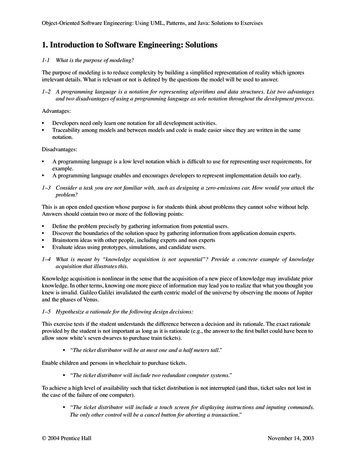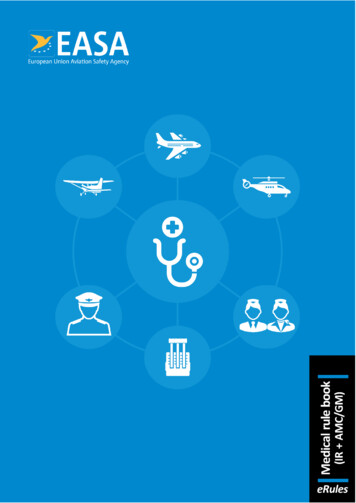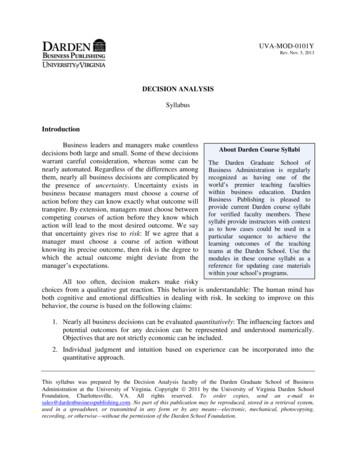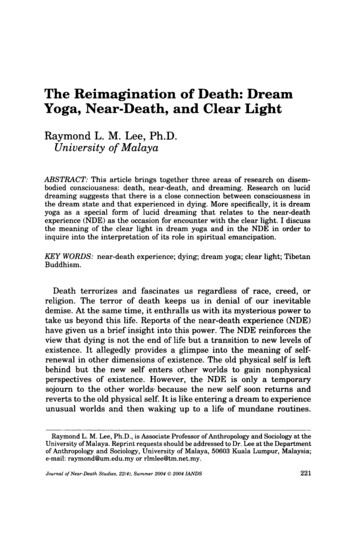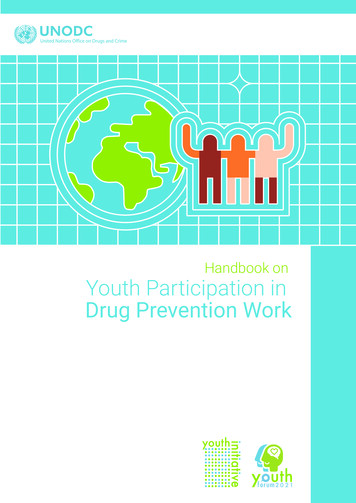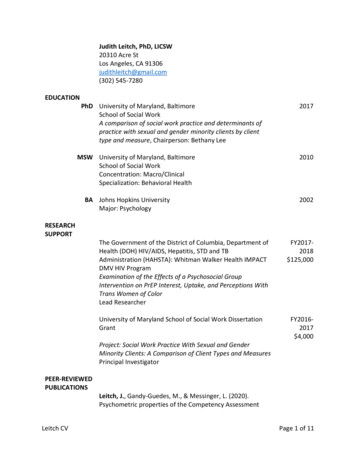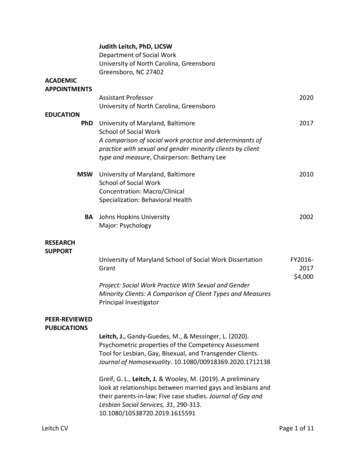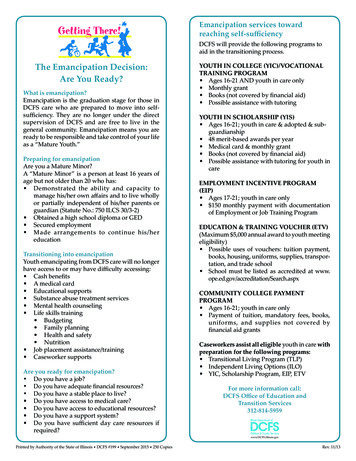
Transcription
Emancipation services towardreaching self-sufficiencyDCFS will provide the following programs toaid in the transitioning process.The Emancipation Decision:Are You Ready?What is emancipation?Emancipation is the graduation stage for those inDCFS care who are prepared to move into selfsufficiency. They are no longer under the directsupervision of DCFS and are free to live in thegeneral community. Emancipation means you areready to be responsible and take control of your lifeas a “Mature Youth.”Preparing for emancipationAre you a Mature Minor?A “Mature Minor” is a person at least 16 years ofage but not older than 20 who has: Demonstrated the ability and capacity tomanage his/her own affairs and to live whollyor partially independent of his/her parents orguardian (Statute No.: 750 ILCS 30/3-2) Obtained a high school diploma or GED Secured employment Made arrangements to continue his/hereducationTransitioning into emancipationYouth emancipating from DCFS care will no longerhave access to or may have difficulty accessing: Cash benefits A medical card Educational supports Substance abuse treatment services Mental health counseling Life skills training Budgeting Family planning Health and safety Nutrition Job placement assistance/training Caseworker supportsAre you ready for emancipation? Do you have a job? Do you have adequate financial resources? Do you have a stable place to live? Do you have access to medical care? Do you have access to educational resources? Do you have a support system? Do you have sufficient day care resources ifrequired?YOUTH IN COLLEGE (YIC)/VOCATIONALTRAINING PROGRAM Ages 16-21 AND youth in care only Monthly grant Books (not covered by financial aid) Possible assistance with tutoringYOUTH IN SCHOLARSHIP (YIS) Ages 16-21; youth in care & adopted & subguardianship 48 merit-based awards per year Medical card & monthly grant Books (not covered by financial aid) Possible assistance with tutoring for youth incareEMPLOYMENT INCENTIVE PROGRAM(EIP) Ages 17-21; youth in care only 150 monthly payment with documentationof Employment or Job Training ProgramEDUCATION & TRAINING VOUCHER (ETV)(Maximum 5,000 annual award to youth meetingeligibility) Possible uses of vouchers: tuition payment,books, housing, uniforms, supplies, transportation, and trade school School must be listed as accredited at www.ope.ed.gov/accreditation/Search.aspxCOMMUNITY COLLEGE PAYMENTPROGRAM Ages 16-21; youth in care only Payment of tuition, mandatory fees, books,uniforms, and supplies not covered byfinancial aid grantsCaseworkers assist all eligible youth in care withpreparation for the following programs: Transitional Living Program (TLP) Independent Living Options (ILO) YIC, Scholarship Program, EIP, ETVFor more information call:DCFS Office of Education andTransition Services312-814-5959Illinois Department ofChildren & Family Serviceswww.DCFS.illinois.govPrinted by Authority of the State of Illinois DCFS #199 September 2015 250 CopiesRev. 11/13
Annual High School Academic Plan MeetingWHAT: The Annual High School Academic Plan (CFS 407 HS) is completed by the caseworker during the Annual HighSchool Academic Plan Meeting at the start of each school year, August through October. Caseworkers are to convene ameeting where the student’s academic progress is reviewed, problems/issues are discussed, and post-secondary planningis begun. The form is to be brought to the youth’s next Administrative Case Review.WHY: To ensure that all DCFS youth are prepared for post-secondary education, vocational training, or employment,and that they learn about the department’s programs that support their plans. Academic problems or issues that areidentified during this meeting will be addressed, and communication with school counselors, other relevant school staff,and NIU education advisors/POS liaisons is encouraged.WHO: Caseworkers, youth, caregivers, school counselors and other relevant school staff should be included in orderto fully address each youth’s individual situation and plans. If youth has an IEP, is lacking credits, or has other specificeducational issues, a NIU education advisor should be invited to participate in the meeting.THE ANNUAL HIGH SCHOOL ACADEMIC PLAN YEAR BY YEARFreshman Year Review academic progress from elementary school/middleschool & identify strengths Identify possible future goals related to career options and/or academic interests Review DCFS transitional services for youth 14 and older Use the Ansell Casey Life Skill Assessment in the discussion Discuss study habits, and any study/support groups or othersupports/resources that may be needed, i.e. tutoring Identify possible extra-curricular activities Complete the Education Profile (CFS 407-4) Complete the AHSAP, including goals for current year,and distribute copies to student, caregiver, counselor, andeducation advisorSophomore Year Review progress from freshman year: is this youth on trackacademically? Acknowledge accomplishments Identify any educational problems or issues Review discussion from Freshman year regarding academicand/or vocational interests Student visit www.careercounseling.com if needed to clarifycareer interests Discuss opportunities for internships, dual credit programs,mentors, volunteer experiences as appropriate Begin to explore possible post-secondary colleges andvocational programs Register for PSAT if appropriate Communicate with school counselor as needed Complete the AHSAP, including goals for current year,and distribute copies to student, caregiver, counselor, andeducation advisorJunior Year Review progress from sophomore year: is this youth on trackacademically? Acknowledge accomplishments Discuss graduation requirements Identify any educational problems or issues Focus on post-secondary goals Involve the school counselor to identify colleges, universities,or vocational programs of interest; take tours Notify youth re: www.collegezone.com to gather informationrelated to school options, financial aid, college costs,scholarships Arrange for youth to register and prepare for ACT/SAT Complete the AHSAP, including goals for current year,and distribute copies to student, caregiver, counselor, andeducation advisorSenior Year Review academic progress, graduation requirements andpost secondary options Discuss graduation requirements Review post-secondary options available to DCFS youth,decide which apply for their situation Give youth a copy of the Get Goal’d brochure Outline youth’s responsibilities in applying for DCFSprograms Finalize list of colleges, universities, or vocational trainingoptions and note application deadlines List out tasks for youth related to college or vocationalprogram admission Assist youth in completing FAFSA in January of thegraduation year Apply for DCFS Scholarship in January Complete the AHSAP, including goals for current year,and distribute copies to student, caregiver, counselor, andeducation advisorPrinted by Authority of the State of Illinois DCFS #199 September 2015 250 CopiesRev. 11/13
DCFS Office of Education and Transition ServicesLife Skills ProgramThe Life Skills Program is designed to enhance youth independent living skills while promoting economicand social self-sufficiency. Caseworkers utilize the Ansell Casey Life Skills Assessment Instruments toestablish an individual base line for the life skills needs of each youth. Individualized transition plans, goalsand timelines are developed to include youth, caregiver and caseworker involvement. Life skills trainingcan consist of group and/or individual instructions, and may include hands-on training. Youth will receivea 150 stipend for completing the entire life skills course. DCFS must have a legal relationship with the youth. Youth must be ages 14 through 20. Youth must reside in substitute care where placement includes, but is not limited to, situations such asFoster Home Private (FHP), Home of Relative (HMR), Foster Home Adoptive (FHA), Foster Home Boarding(FHB), or Youth In College (YIC), etc. Youth must be assigned to a DCFS or Purchase of Service (POS) caseworker.Referral Process:DCFS or POS permanency caseworkers send referral packets to the OETS transition manager. Recommendationsfor service delivery are accepted. Referral packets should include: A completed CFS 912 (Life Skills Referral) form. A current social history report (prepared within the past six months). An Integrated Assessment report isacceptable in lieu of a current social history report. A current service plan (CFS 497) face sheet, which includes the entire child summary and signature page. A completed and scored Ansell Casey Life Skills Assessment and the Life Skills Individual Plan consistingof a maximum of ten goals assigned to a life skills provider. Consent for Release of Information (CFS 600-3) that allows OETS to share youth’s information with thetransition agency.For more information, contact:Cook RegionTransition Manager6201 S. Emerald Dr.Chicago, Illinois 60621773-371-6134Northern RegionTransition Manager8 E. Galena Blvd., 3rd Fl.Aurora, Illinois 60506630-801-3446Central & Southern RegionsTransition Manager2309 W. Main St.Mt. Vernon, Illinois 62959618-993-7100Illinois Department ofChildren & Family Serviceswww.DCFS.illinois.govPrinted by Authority of the State of Illinois DCFS #199 September 2015 250 CopiesRev. 2/16
Community College Payment ProgramThe Community College Payment Program allows youth under DCFS Guardianship enrolling in an Illinoiscommunity college the opportunity to have their in-district tuition, fees, required books, supplies, uniforms andequipment, paid by DCFS if they are not paid by financial aid grants. Payment requests can be submitted for careerand technical education programs that are part of the community college curriculum. Requests for out-of-districtand prior fiscal years’ tuition will not be approved.Eligibility Criteria: Must be a youth for whom DCFS is legally responsible Must be accepted for enrollment by an in-district community college Must maintain Satisfactory Academic Progress (SAP) Must apply for financial aid through FAFSA within required deadline set by the college, designate communitycollege to receive funds, and provide all documentation requested by the school. FAFSA funding is to be usedbefore requesting payment from DCFS.Benefits: Payment of in district community college tuition, fee, required books, supplies, uniforms, and equipment notcovered by financial aid grants. Services and assistance as required from my permanency worker and/or DCFS education advisors.Permanency Worker Responsibilities: Assist youth with completing school enrollment, FAFSA, financial aid, and all other paperwork requested bythe school. Complete CFS407-3, review with youth and have youth read and sign Service Agreement portion of application. Submit completed CFS407-3 to DCFS Community College Payment Program Coordinator at least 30 days priorto class start date.Youth Responsibilities: Complete ALL necessary steps to receive FAFSA related financial aid. Participate in education support/tutoring offered by school to maintain Satisfactory Academic Progress (SAP). Send an official copy of class schedule and grades to caseworker within two weeks of having access to them. Sign FERPA forms allowing school to communicate with permanency worker and CCPP coordinator. If the youth does not drop classes by drop/add date, he or she will be responsible for paying bill.Payment Request Process:Community College must submit the completed CFS407-3 along with student schedule, invoice and proof offinancial aid status for each semester that payment is being requested to:Illinois Department ofDCFS Community College Payment Program2001 NE Jefferson Avenue, Peoria, IL 61603Phone: 309-671-7969 Fax: 309-671-7946Children & Family Serviceswww.DCFS.illinois.govPrinted by Authority of the State of Illinois DCFS #199 September 2015 250 CopiesRev. 2/16
Education & Training VouchersResource for Lifetime AchievementThe Education and Training Voucher (ETV) program assists youth with post-secondary educationrelated expenses not covered by financial aid grants.Eligibility: Youth for whom DCFS is legally responsible or who aged out of care at age 18 or olderOR Achieved permanency at age 16 or older through either subsidized guardianship or adoptionBenefits: Payment of up to 5000 annually of education related expenses such as tuition, fees, books,supplies, uniforms, equipment and/or transportation not covered by other grants or scholarships Funding available until age 21 If enrolled in a post-secondary program and student has used ETV funding before age 21 andmaking satisfactory progress toward completion of the program, funding is available untilage 23Requirements: Attend post-secondary school listed as accredited by US Department of Education Make satisfactory academic progress File FAFSA (Free Application for Federal Student Aid) annually Complete any additional financial paperwork required by the school Submit completed application with requested documentation each termApproval decisions and actual voucher award amounts are determined by the Office of Educationand Transition Services (OETS).Applications and Questions:DCFS Office of Education and Transition Services 2001 NE Jefferson Ave., Peoria, IL 61603Phone: 309-671-7969 Fax: 309-671-7946Illinois Department ofChildren & Family Serviceswww.DCFS.illinois.govPrinted by Authority of the State of Illinois DCFS #199 September 2015 250 CopiesRev. 5/14
Employment Incentive ProgramThe Employment Incentive Program (EIP) is designed to provide financial and supplementalservices to help adolescent youth gain marketable skills through on-the-job work experience orthrough job training programs. Youth who complete the EIP are equipped with the employmentskills and work ethics necessary for a successful transition to independence.Eligibility Requirements: Be 17 years of age, and not yet 21 Have a high school diploma or a General Education Development (GED) certificate Be under court-ordered legal responsibility of DCFS Complete Casey life skills assessment Be involved in job training through a certified job skills training program (e.g., Job Corps,apprenticeship, internship), or be employed for at least one month prior to applying for theEIP and working a minimum of 20 hours per weekBenefits: Monthly payment of 150.00 with documentation for a maximum of 12 months or age 21,whichever comes first Start-up funding for work-related items (e.g., tools, work clothing, etc.). Funding is need-basedand limited to a one-time disbursement of up to 200.00 with required documentation.Referral Information Requirements: Employment Incentive Program Application (Form CFS 449-2) Current Client Service Plan (Form CFS 497) Service Agreement signed by youth and caseworker Verification of employment or job training program participationFor more information, contact:Chicago Springfield312-814-6804217-557-2689Illinois Department ofChildren & Family Serviceswww.DCFS.illinois.govPrinted by Authority of the State of Illinois DCFS #199 September 2015 250 CopiesRev. 11/13
Youth Housing Assistance ProgramDCFS may provide Youth Housing Assistance to help attain or maintain housing stability for youth that the departmentcurrently has or previously had legal responsibility. There are two parts to Youth Housing Assistance: Housing Advocacy andCash Assistance, each of which is explained below. Often a client will need housing advocacy services first. Once housingis identified, that same client needs cash assistance. Other clients will not need housing advocacy at all and will simplyutilize cash assistance. Still others just need help finding housing and do not need any cash assistance. Call for details.Housing AdvocacyHousing advocacy services assist clients in obtaining and/or maintaining stable housing. Services include: Assistance in securing affordable housingConsumer educationBudget counselingNote: Housing Advocacy does not include any money. Linkages to community based resources (i.e. assistancewith utilities, clothing and food)Follow-up services for a minimum of three months afterthe client secures appropriate housingEligibility:Youth receiving housing advocacy services must meet all three of the following criteria:1. Be at least 17 ½ and less than 21 years of age;2. Be legally the responsibility of DCFS within six months of case closure, or have aged out of DCFS care;(Note: Youth that entered adoption or subsidized guardianship after their 14th birthday are also eligible.); and3. Have an income that is sufficient to meet rent and utility costs; or be working on obtaining that income. (Whilehousing advocacy can begin before income is in place, it is extremely unlikely that youth will be able to securehousing without sufficient income. Housing advocates can often help with employment.)Cash AssistanceAssistance will vary depending on a client’s situation. Cash assistance may be authorized for the following reasons: Housing security deposit Rent (limited circumstances) Beds for the client and the client’s children Current utility bills or utility deposits Appliances Partial housing subsidy for a period of one year following case closure (housing costs must exceed 30% of incomeand assistance cannot continue past the client’s 21st birthday) Other items required by the client to avoid or manage a crisisEligibility:Youth receiving Cash Assistance must meet all four of the following criteria:1. Be at least 18 and less than 21 years of age;2. Be legally the responsibility of DCFS and ready for case closure or have aged out of DCFS care. (Note: Youth thatmoved to adoption or subsidized guardianship are NOT eligible for cash assistance);3. Have completed a budget statement (Form CFS 370-5C) that demonstrates that with any subsidy and all other incomethey will be able to cover all remaining living expenses (e.g. housing, utilities, clothing, food); and4. Need cash assistance in order to attain or maintain stable housingReferral Process or QuestionsPlease discuss this letter with your caseworker. For more information, caseworkers may contactthe Youth Housing Assistance Coordinator at 312-814-5571 (Phone) or 312-814-7134 (Fax).Printed by Authority of the State of Illinois DCFS #199 September 2015 250 CopiesRev. 11/13
Youth Housing Assistance ProgramFrequently Asked QuestionsQ.A.I used to be in DCFS care. I am now 21 years old. May I receive these services?No, you are no longer eligible for any of these services when you turn 21, no matter what.Q.A.Am I entitled to this money?No. This program is based on need, not entitlement.Q.A.Will you pay for my housing?No, the idea of housing advocacy is to help you find housing that you can afford. For those eligible forcash assistance, we can also help with certain housing start-up expenses, such as a security deposit.Q.A.I need a job. What can I do?Any education and transition coordinator can assist you in attaining employment by referring you toemployment and training programs and services.Q.A.I was adopted or entered subsidized guardianship. Am I eligible for housing advocacy?Yes, you are eligible for housing advocacy if you were adopted or moved to subsidized guardianshipafter your 14th birthday. (Note: Housing Advocacy does not entitle you to money.)Q.A.I was adopted or entered subsidized guardianship. Am I eligible for cash assistance?No, if you were adopted or moved to subsidized guardianship you are not eligible for any cash assistance.Q.A.Can my husband/wife/boyfriend/girlfriend/partner live with me? What about children?If anyone in your household is eligible for services, we can serve your household, however you define it.We will look at your household income to determine if housing you find is affordable for you.Q.A.What about roommates?Sometimes having one or more roommates is the best way to make your housing affordable. You maywant to consider this option. We will ask some questions about your roommates’ income to make surethis housing situation is affordable for all of you.Q.A.Do you have an apartment I can move into right now?No, we do not have any apartments. Our housing advocates will provide assistance with finding housingon the open market, anywhere in Illinois.Q.A.What if I don’t live in Illinois?First, call your local child welfare office (where you are) and ask for Chafee services. Tell them you agedout of the Illinois child welfare system. If you need help accessing these services, call the number belowand we will try to help. If you still need help, but can find your own housing and can afford the monthlyrent, we may be able to help you by mailing a check for the security deposit to your landlord. Call to seeif this is possible.Illinois Department ofChildren & Family Serviceswww.DCFS.illinois.govPrinted by Authority of the State of Illinois DCFS #199 September 2015 250 CopiesRev. 11/13
Scholarship ProgramEligibility Requirements: The department must have court-ordered legal guardianship for the applicant, the applicant must haveaged out of DCFS guardianship at age 18 or older, or the department must have had legal guardianshipfor the applicant immediately prior to the adoption or guardianship being finalized. The applicant must be at least 16 years old, but not yet 21, on the scholarship application deadline ofMarch 31 each year Successfully compete for a DCFS college scholarship Maintain at least a “C” average each semester Maintain full-time status (12 hours Fall & Spring, 6 hours or an approved internship in Summer).Enrollment will be verified through the National Student Clearinghouse. Submit your class schedule at the start of each semester and your grades at the end of the semester (noschedule and grades, no payment!) Report changes to any contact information promptly to the DCFS scholarship administratorBenefits: A grant award in the amount of 511 per month. Direct deposit is strongly recommended. Medical card provided to Illinois students until the earlier of four years or age 23 Tuition waiver available to any Illinois state funded community college or university Reimbursement of the cost of books not covered by financial aid Benefits available for five consecutive year or through the semester the youth turns 23, whichever occursfirst This program is a chance of a lifetime!Important Plans To Consider: Arranging transportation to the school location Planning for housing when school is closed for breaks and holidays Devising a backup plan for education finances if your monthly grant is lost or stolen Seeking tutorial assistance through the school, and meeting with OETS staff if your grades are low, ifyou are having problems in a particular course, or if you must withdraw from any classes Youth who withdraw from classes must notify the OETS business office Apply for financial aid annually.What the Scholarship DOES NOT Cover: Orientation fees Computers or Internet services Room/board costs Repayment of student loans Tuition to private, out-of-state orvocational training programs Study abroad Phone billsDorm room damagesLaboratory feesTransportation to and from schoolStudy enhancement programsSuppliesLibrary finesSee reverse side for more details.Printed by Authority of the State of Illinois DCFS #199 September 2015 250 CopiesRev. 1/15
Important DatesPlease mail the following documents to the Office of Education and Transition Services by thefollowing dates:August 15January 15June 15Schedule, Summer Grades, Address ChangesSchedule, Fall Grades, Address ChangesSchedule, Spring Grades, Address ChangesPay Run Dates for 0/12/1611/14/1612/12/16NOTE: All mailing dates are estimated.Important Phone NumbersCentral Payment UnitDirect DepositMedical Card HotlineYouth -6884Education AdvisorsChicago OfficeSpringfield Business Office815-753-5562312-814-6800217-557-2689Illinois Department ofChildren & Family Serviceswww.DCFS.illinois.govPrinted by Authority of the State of Illinois DCFS #199 September 2015 250 CopiesRev. 2/16
Youth In College/Vocational Training ProgramEligibility Requirements: DCFS must have court ordered legal responsibility for youth. Youth must have high school diploma or GED certificate or be enrolled as a full-time student in an accrediteduniversity or a vocational training program. Must complete the CFS 449 (Youth in College/Vocational Training Program application). Must be at least 16 years old and not yet 21 Maintain at least “C” average each semester. Maintain full-time status (12 hours Fall & Spring, 6 hours in Summer, or an approved summer internship).Enrollment will be verified through the National Student Clearinghouse. Submit youth class schedule at the start of each semester and your grades at the end of each semester (noschedule and grades, no payment!) Report any change of address promptly to your YIC Coordinator. Apply for financial aid every year to cover tuition or room and board costs. Youth transitioning to the YIC program at age 21 must have completed at least one semester of a postsecondary program at full time status with a 2.0 GPA or higher.Benefits: Youth may choose to attend an accredited vocational school, four-year college or community college. A monthly grant in the amount of 511. Direct deposit is strongly recommended. Reimbursement available for books not covered by financial aid. Education advisors and OETS staff are available for assistance. Benefits available through the semester the youth turns 23. Youth are eligible for a one-time start up funding in the amount of 200 to be used for initial living expenses.Important Plans To Consider: Arranging transportation to the school location Planning for housing when school is closed for breaks and holidays Devising a backup plan for education finances if your grant is lost or stolen Seeking tutorial assistance through the school, and meeting with your education advisor and OETS staffif your grades are low, if you are having problems in a particular course, or if you must withdraw fromany classes. Education and Training Voucher Program for expenses not covered by Youth in College/VocationalTraining Program.What the Youth In College/Vocational Training Program DOES NOT Cover: Orientation fees Phone bills Computers or Internet services Library fines Room/board costs Dorm room damages Laboratory fees Repayment of student loans Supplies Transportation to and from school Study abroad Tuition Study enhancement programsSee reverse side for more details.Printed by Authority of the State of Illinois DCFS #199 September 2015 250 CopiesRev. 1/15
Important DatesPlease mail the following documents to the Office of Education and Transition Services by thefollowing dates:August 15January 15June 15Schedule, Summer Grades, Address ChangesSchedule, Fall Grades, Address ChangesSchedule, Spring Grades, Address ChangesPay Run Dates for 0/12/1611/14/1612/12/16NOTE: All mailing dates are estimated.Important Phone NumbersCentral Payment UnitDirect DepositMedical Card HotlineYouth -6884Education AdvisorsChicago OfficeSpringfield Business Office815-753-5562312-814-6800217-557-2689Illinois Department ofChildren & Family Serviceswww.DCFS.illinois.govPrinted by Authority of the State of Illinois DCFS #199 September 2015 250 CopiesRev. 2/16
Promoting Academic Excellence Get involved by attending school activities, parent/teacher conferences and parent board meetingsCommunicate often with youth’s teacher(s) and counselorAssist youth with identifying academic interests, goals, strengths and areas needing improvementShow interest in your child’s academic world by assisting him/her with getting organized,inquiring about his day and designating a distraction-free study areaAssist with developing time management skills and prioritizing assignmentsReview completed assignments and assist with test preparationEncourage daily reading to assist with improving reading and comprehension skillsEncourage youth to perform his/her best and congratulate all accomplishmentsExplain standardized exams, support and encourage youth’s best performanceDuring the month of March, 3rd, 4th, 5th, 7th, and 8th graders will take the Illinois StandardizedAchievement Test (ISAT)Discuss high schools of interest during 5th grade, explain that 7th grade reading and math scoresfrom the ISAT will determine high school eligibilityDuring sophomore year of high school, encourage youth to begin identifying colleges oruniversities of interestDuring junior year of high school, encourage youth to attend college toursEnsure that students register to take the ACT during their junior year of high schoolAll high school juniors must take the Prairie State Achievement Exam (PSAE) or its equivalentduring the SpringDuring the months of October and November, 12th graders should begin sending out applicationsto college(s) of interestEnsure that seniors complete the Free Application For Federal Student Aid (FAFSA) form inJanuary12th grade students should apply for DCFS Scholarship January through March12th grade students should apply for self-identified college scholarships, noting applicationdeadlinesComplete all financial aid paperwork at schoolAttend college orientations once acceptedEnroll into the DCFS Youth in College at least 2 months prior to attending college of choiceOffi
Life Skills Program The Life Skills Program is designed to enhance youth independent living skills while promoting economic and social self-sufficiency. Caseworkers utilize the Ansell Casey Life Skills Assessment Instruments to establish an individual base line for the life skills ne
